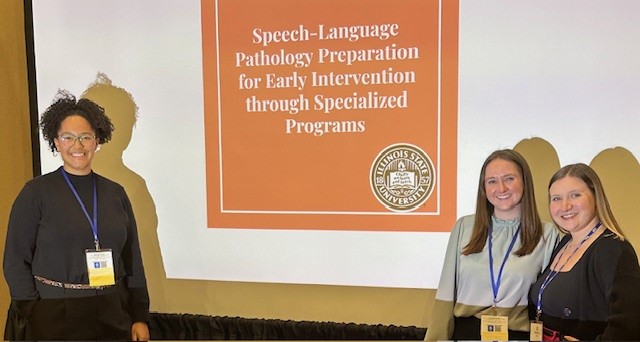
Every year, speech-language pathologists (SLP) and audiologists (AuD) gather for an annual convention hosted by the Illinois Speech-Language-Hearing Association (ISHA). The 64th convention took place February 9-10 in Rosemont. Illinois State Department of Communication Sciences and Disorders (CSD) alumnae Liz Jones-Rogers, M.S. ’22, and Brae Wence, M.S. ’22, and SLP graduate student Bridget McCracken presented their research on early intervention preparation through specialized graduate programs at ISHA.
They were enrolled in additional classes as part of the Leveraging Instruction to Maximize Interdisciplinary Teaming in Learning Environments of Family Systems When Children Have Sensory Disabilities (LIMITLESS) grant program in addition to their SLP graduate program classes. This program specializes in early intervention, interdisciplinary teaming, and sensory disabilities, such as visual impairment and deaf/hard of hearing.
Their study examined how SLP graduate programs prepared students for working in early intervention and compared them to specialized early intervention graduate programs or courses. They found that there was a difference in how much participants felt prepared depending on whether they were part of a specialized program or course. There was still a knowledge gap between what SLPs knew when they graduated from graduate school and what they should know when starting early intervention, even if people from specialized programs felt more prepared.
All participants felt they had received enough instruction in conducting language therapy for the birth to 3-year-old population, and they believed that they could competently model and explain 87% of the 35 speech, language, and/or listening strategies to families.
They discovered that while participants felt least prepared for the business aspect of being an early intervention provider (such as paperwork and credentialing), they felt most prepared for providing therapy services across various domains of their scope of practice (such as language, speech sounds, and aural rehabilitation). Being part of a specialized program has helped SLPs learn more about the early intervention process. However, there is still more content that all programs can consider including in the curriculum.
